Do you know what time of the year it is? It’s tick season!
Lately, since spring has come, when I work out in my garden or when my family goes on our weekend hikes, there have been ticks on our clothing and even on our dogs. Ticks are a health hazard and a real nuisance, not just for humans but also for our pets. There are, however, some actions that you can take to diminish this pest in the area you live and prevent it from impacting your life.
Troublesome Parasites
Ticks are part of the arachnid family which also includes scorpions, spiders, and mites.
A tick attaches itself to animal and human skin and sucks their blood. There are hundreds of kinds of ticks found throughout the world. The tick can cause terrible infections which impact serious health issues, including sepsis and even death, if not treated promptly. Ticks carry diseases such as Tularemia, Ehrlichiosis, Relapsing fever, Lyme disease, Rocky Mountain spotted fever, Babesiosis, and Colorado tick fever; and pass them on to a host (people and animals).
It’s no wonder that we need to be knowledgeable about controlling the tick population and responsive to any bites.
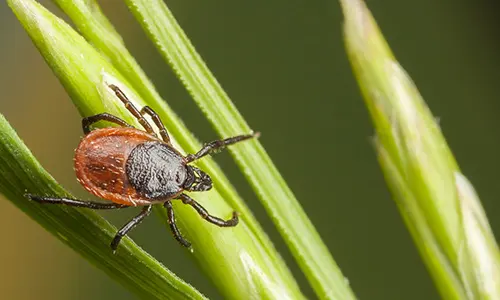
Controlling The Tick Population Near You
There are a few significant variables that influence the number of ticks found where you live.
Usually, a mild winter and a large amount of moisture helps increase the tick population. The egg is the start of the tick life cycle; each tick can, in turn, lay 2,000–18,000 eggs; so, it seems logical to try and reduce the number of eggs. Some ticks lay eggs on the ground outdoors in protected spots, while others lay them indoors, usually on carpet or other fabrics. Once you spot the eggs, you can spread some salt on top of them or burn them.
For example, spread salt on a carpeted area inside your house, simply wait about seven days and vacuum up the salt, or carry the rug outside and burn the eggs there.
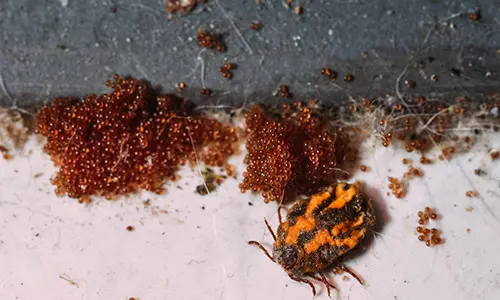
Additional Measures
The first thing to think about is your pets. Dogs and cats can easily bring ticks into your house or onto your property. There are flea and tick collars, medications, and shampoos that treat your pets to prevent them from getting the ticks to begin with. There are also contact sprays that can be used on your property (landscape and lawn) to kill the ticks, so they can’t spread and eventually get on you, your pets, and into your house.
For example, Talstar kills the tick upon contact; there isn’t any residual, so it needs to be reapplied during the tick season for maximum protection.

Further Protections
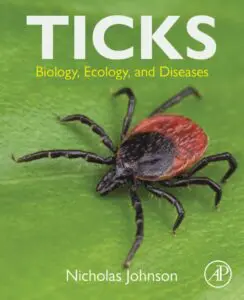 The next time you venture into the woods to hike or camp, bring some insect repellent along. Deet is one repellent that repels ticks from your clothing, skin, etc. Look for a repellent that contains 10–30% Deet. Perhaps a better choice for treating clothing is permethrin, a synthetic insecticide sprayed on clothing and then left to dry. The product kills almost immediately, within 30 seconds of initial contact, and retains its effectiveness until the clothing items are washed.
The next time you venture into the woods to hike or camp, bring some insect repellent along. Deet is one repellent that repels ticks from your clothing, skin, etc. Look for a repellent that contains 10–30% Deet. Perhaps a better choice for treating clothing is permethrin, a synthetic insecticide sprayed on clothing and then left to dry. The product kills almost immediately, within 30 seconds of initial contact, and retains its effectiveness until the clothing items are washed.
There are also bracelets that you can buy that serve the same purpose. These are especially a good option if you are opposed to using chemicals. Subsonic devices can be used to repel the ticks through sound waves.
In addition, there are several kinds of natural insect repellents. Wearing long sleeves and long pants and tucking your pants into your socks will also prevent the ticks from getting on your skin.
But what happens when the repellents run out? Or the creams and pills you count on aren’t available anymore?
When Pharmacies Run Dry… This Is What You’ll Wish You Had
You can swap out your food. You can choose fluoride-free toothpaste. You can try to eat organic. But as long as you’re still dependent on over-the-counter pills, creams, and prescription drugs, you’re not safe.
The truth is, every shelf in every store is loaded with chemicals. Even the ones labeled “natural.” And if we ever reach a point where the system cracks — if supply chains freeze, shelves go empty, or drug ingredients get restricted — you’ll have nothing.
That’s when this book becomes your lifeline.
The Forgotten Home Apothecary is the ultimate guide to replacing chemical-laced, pharma-dependent products with powerful, time-tested remedies you can make at home.
You’ll learn exactly how to make your own tinctures, capsules, oils, teas, salves, elixirs, syrups, and poultices from plants you can find growing around you — or already in your kitchen.
These are not “Pinterest cures” or folk tales. These are battle-tested remedies used by herbalists, survivalists, and those who want real protection when nothing else is available.
Inside, you’ll discover powerful remedies like:
🧴Psoriasis Irritation Relief Herbal Ointment – calms red, flaking skin fast using soothing herbs that work better than steroid creams — and without the side effects
🧰Arnica and Calendula First Aid Spray – your grab-and-go remedy for cuts, bruises, and scrapes. Heals on contact and helps prevent infection naturally
🪲Bug-Off Spray – a potent, plant-powered shield against ticks, mosquitoes, and biting flies. No DEET, no toxins
🦟Anti-Mosquito Salve – rub it on exposed skin and watch the bugs back off — it smells great to you but repels pests like nothing else
🩹Anti-Itch Plantain Band-Aid – crush this wild green leaf and apply for instant relief from bites, stings, and rashes — nature’s itch eraser
🔥Cooling Herbal Gel for Burn Relief – soothes the sting of minor burns and sun exposure fast, with cooling herbs that help skin heal clean and quick
🌿Yarrow Stop Bleeding Powder – stops bleeding in seconds — a must-have remedy that’s been used on battlefields for centuries.
💥Painkiller In a Jar – crafted from wild lettuce, known as “nature’s opium” but legal, safe, and non-addictive
🦠 Nature’s Amoxicillin – a plant-based antibacterial formula to help fight infections and boost immunity
🌱 Herbal Parasite Flush – a powerful three-ingredient recipe to eliminate worms and cleanse your gut
🍀 The Backyard Aspirin – learn to use willow bark like early apothecaries did — it works like real aspirin, without the synthetic junk.
And that’s just the beginning.
This book may be the only thing standing between you and full pharmaceutical dependence in a time of crisis.
 Click here to get The Forgotten Home Apothecary before it’s gone. Limited edition. Real remedies. No chemicals.
Click here to get The Forgotten Home Apothecary before it’s gone. Limited edition. Real remedies. No chemicals.
Related: The Indispensable Medicinal Garden Every Homestead Should Have
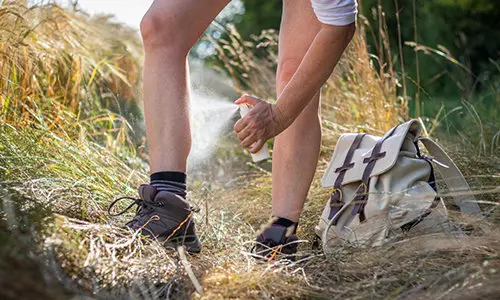
How To React When Bit
In the event that you are bitten by a tick, you need to use caution in removing it, so as not to leave its head buried under your skin.; which may likely cause an infection or more serious disease. There are some common techniques for helping to remove the tick carefully but have since been found to be counter-protective.
One typical way was to use a hot match head to burn the tick. But instead of releasing your skin, the tick has been found to dig even deeper into the skin. Another popular technique was to use fingernail polish or Vaseline and smother the tick. However, this made the tick dig deeper into the skin as well.
Related: Plant These To Keep The Pests Away
The best choice is to wet a Q-tip and then press gently on the tick’s body and roll the tick in circles until it releases. Be careful not to squeeze the tick because the internal liquids may enter your bloodstream.
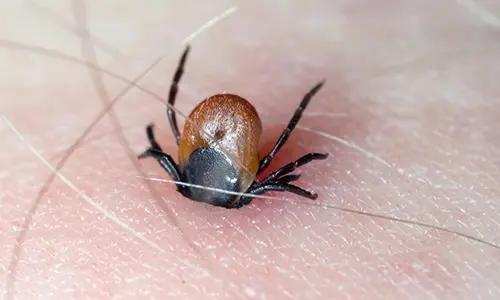
It’s important to know that ticks should be taken seriously as they can be dangerous. With the right precautions, you can continue to enjoy the outdoors and your favorite activities. Do your part to help control the tick population, treat your yard and your pets, and use a repellent on your body and clothing to repel the tick from the onset.
Wear appropriate clothing outside, especially in wooded areas. Check for ticks when your pets or you come indoors. And remember to remove any tick that is found immediately.
With these tips in mind, you can continue to relish your time spent outdoors!
Is It Legal To Harvest Rainwater In Your State?
Do This Immediately If You Find These Tracks In Your Backyard (Video)
Best Dog Breeds For Homesteaders

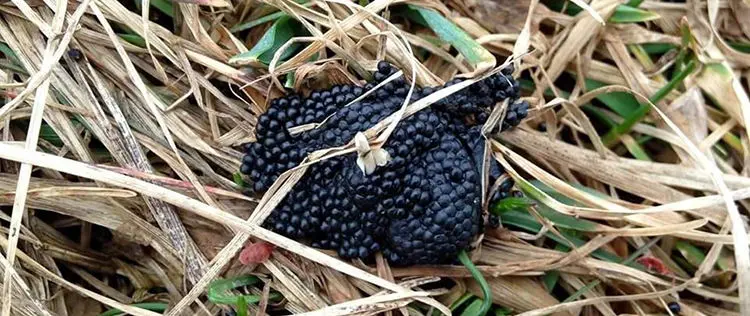

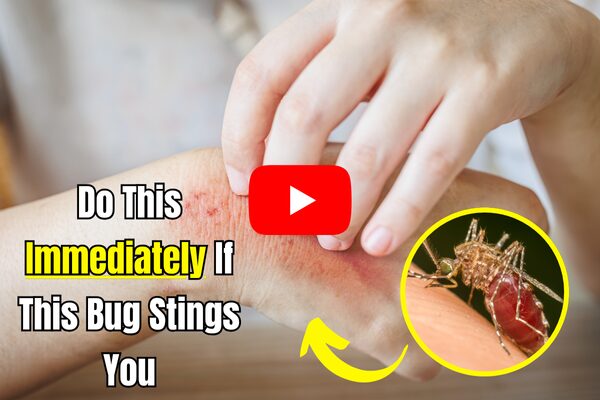













What is the first picture? It is much too large to be tick eggs. I have found these in my house. I contacted the county extension and although they assured me they weren’t tick eggs, they could not tell me what they were. I never did find out.
That’s clearly a tick nest. It looks large, because it’s a closeup.
Great Resources
Should one also take the time to remove ticks from livestock such as: Chickens, Goats, Sheep, Ducks, etc.?
A Hot Saice like Tabasco sauce or Pepeint Oil directly on Toc or use dipped q-tip….. it Will Realesse…. From yourself or your animal. Make sure to inspect those Pawpads too
To remove tics easily use a Tic Out Tool (mine came two to a pkg, one lrg and one small size). Best thing ever invented and the price was less than $5.00. We live in tic infested northern WI and trust me this tool gets a good work out. People have a lot of antics on how to remove tics but this is the best I’ve found. You slide it under the tic and twist and the tic will start walking away from the area they were imbedded. I kid you not.
Believe it or not but vapo rub directly on them and they release almost immediately.
It seems to work as a repellent as well.
Mosquito’s don’t seem to like it either.
A Dermatologist that is a specialist in ticks and the various kinds, etc. told me that the tick HEAD is NOT what is left behind when pulling one off. It is the NOSE (which is much smaller) that is left behind and can be under the skin for as long as a year. I had the nose removed surgically just to get rid of it after the area of the bite kept swelling when touched.
My husband just found some hidden along some of our rocks in our yard.
We use to get ticks all the time in the spring on the coast of Oregon. I had to check me kids every time they played out side and the dog .stripped the kids down and checked them . We use to twist the tick counter clock wise slowly come out ever time head and all ! Never put a hot match on them! You will kill the tick and not get it out !
If you get a dozen guinea hens, they will eat all the tick.. I’m assuming that they would eat the eggs also..
There are many plants you can plant at the edges of (and inside) your yard. Not only are they, because of their strong scent, rejected by ticks, but the animal hosts (wild life) that bring them into your yard are deterred by these plants. I grow mint, lavender, thyme, rosemary and wormwood, amongst others plants, to keep ticks, deer, rabbits, mice, etc., out of the yard.
1st photo, the eggs are definitely not tick eggs,” “They’re way too big.” Snopes suspects the viral photo, which actually dates back to 2015, may actually depict frog eggs spit out by an unsuspecting predator.
Real tick eggs are so teeny-tiny, the entire batch is only as big as two adult female ticks. They also look more reddish-brown — not black like in the picture, Dr. Kimsey adds.
The picture on this pin is not tick eggs and destroying those may be destroying something that is beneficial and critical in the environment, such as spiders, or other types of insects.
This is the correct info on tick eggs:
https://www.prevention.com/life/a32403848/tick-nest-eggs-pictures/